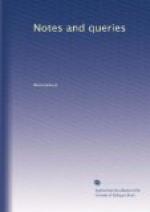4. What is the earliest printed copy of the beautiful old song “My Mind to me a Kingdom is?” It is to be found in a rare tract by Nicholas Breton, entitled The Court and Country, or A Briefe Discourse betweene the Courtier and Country-man, 4to. 1618. Query, is Breton its author?
5. Mr. Edward Farr, in his Select Poetry, chiefly Devotional, of the Reign of Queen Elizabeth (vol. i, p. xix.), calls Nicholas Breton, Sir Nicholas. Is there any authority for Breton’s knighthood?
6. Can John Davies, the author of Sir Martin Mar-people, 1590, be identified with John Davies of Hereford, or Sir John Davies, the author of Nosce Teipsum, 1599?
7. In whose possession is the copy of Marlow and Chapman’s Hero and Leander, 1629, sold in Heber’s sale (Part iv., No. 1415)? Has the Rev. Alex. Dyce made use of the MS. notes, and the Latin Epitaph on Sir Roger Manwood, by Marlow, contained in this copy?
8. Has any recent evidence been discovered as to the authorship of The Complaynt of Scotland? Is Sir David Lindsay, or Wedderburn, the author of this very interesting work?
9. In the Rev. J.E. Tyler’s Henry of Monmouth (vol. ii Appendix, p. 417.), is a ballad on The Battle of Agincourt, beginning as follows:—
“Fair stood the wind for France,
When we our sails advance;
Nor now to prove our chance,
Longer will tarry;
But, putting to the main,
At Kaux, the mouth of Seine,
With all his martial train,
Landed King Harry.”
The author of this old ballad, the learned editor says, was Michael Drayton; but I have not been able to find it in any edition of his works which I have consulted. Can Mr. Tyler have confounded it with Drayton’s Poem on the same subject? Any information on this point will be very acceptable.
10. On the fly-leaf of an Old Music Book which I lately purchased is the following little poem. I do not remember to have seen it in print, but some of your correspondents may correct me.
“TO THE LORD BACON WHEN FALLING FROM FAVOUR.
“Dazel’d thus with height
of place,
Whilst our hopes our wits
beguile;
No man marks the narrow space
’Twixt a prison and
a smile.
“Then since fortune’s favours
fade,
You that in her arms do sleep,
Learn to swim and not to wade,
For the hearts of kings are
deep.
“But if greatness be so blind,
As to burst in towers of air;
Let it be with goodness lin’d,
That at least the fall be
fair.
“Then, though dark’ned you
shall say,
When friends fail and princes
frown;
Virtue is the roughest way,
But proves at night a bed
of down.”
It is in the hand-writing of “Johs. Rasbrick vic. de Kirkton,” but whether he was the author, or only the transcriber, is uncertain.




